八年级英语上册unit8naturaldisasters第3课时readingii教案新版牛津版139
[推荐学习]八年级英语上册Unit8NaturaldisastersPeriod3ReadingII
![[推荐学习]八年级英语上册Unit8NaturaldisastersPeriod3ReadingII](https://img.taocdn.com/s3/m/8edad625581b6bd97f19ea58.png)
Unit 8 Natural disastersPeriod 3 Reading IILearning aims1. To learn some new words and know more about natural disasters.2. To encourage to do more to protect nature.Learning activitiesActivity one Having a dictation of new wordsActivity two Free talk1.What happened in an earthquake?2.When a terrible disaster comes, can we give up easily?3.How can people survive in an earthquake / a fire / a flood / a snowstorm / a typhoon ?Activ ity three Understanding of the language pointsStep 1 Usages of some new words1. fear: People in the shopping centre looked at each other in fear.句意:_________________________________________________________常用词组:in fear 害怕地Frightened by the loud noise, the children looked at each other .(害怕地)2. shake: The earth started to shake.句意:______________________________________________________词义:___________词性:_________ 过去式:_________ 过去分词:翻译:使用之前摇匀瓶子 the bottle well before use.。
八年级英语上册 Unit 8 Natural disasters Period 3 Reading Ⅱ教案

Unit 8 Natural disasters (Reading Ⅱ)教学目标:1 .To revise what they learned about the earthquake and help the students to understand the passa ge better .2.To read the passage again and help them to highlight the importantlanguage points and sentence patterns.3.To teach the students to learn to protect themselves when they arein danger教学重点:1.Highlight the important language points and sentence patterns2.Make an interview教学难点:Get the students tohave the first impressions of Past Continuous Tense 教学程序:预习作业:Do some exercises预习交流:Ⅰ.Free talk and ask some questions by using pictures to check if the students get the general meaning of th e reading material.1 What can you see in the picture ?2 What happened ?3 What happened to this building ?4 What kind of sound can you hear ?5 How do you know that there is go ing to be an earthquake ? How will you feel atthe verybeginning ?6 If this building is shaking now , what will you do ? Will you be afraid /befrightened ?Are you going to scream ? Are you going to run/jump ?You should calm down and think what the best way to escape is , so that you can stay alive .7 Suppose you are in danger , that means th ere are lots of bricks around you , you can’t move your body , you’re trapped . What are you going to do ?8 If you have a packet of chocolate , you’re hungry ,are you going to eat it ? Why or why not ?Ⅱ.Check out the prepared work.1.Check the answers in groups2.The teacher presents some important phrases3.Read and learn the phrases by heart.交流展示:Ⅰ.Finish Part B1, make further understanding of key words.Ⅱ. ReadingGet the students to read the article and make lists of words and phrases used in the text that describe noise and movement /destruction ,fear and hopeSuch as : noise : big noise ,thunder , screamed , real noise , bombs ,shoutedmovement : slight shaking, earth started to shake, run wildly , pieces of glass bricks fell down, walls began to come down .fear : screamed, frightened, dark, a moment of fearhope: stay alive, a packet of chocolate, shouts from excited peopleⅢ.ExplainingDeal with the problems the students may have.1. do some shopping 购物such as : do some 洗衣服do some 打扫卫生do some 阅读2 feel a slight shaking 感到一阵轻微的震动。
牛津译林版英语初二(八年级)上册 Unit 8 Natural disasters Reading I The Taiwan Earthquake 公开课课件
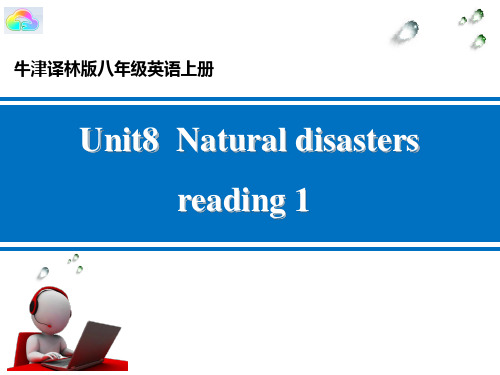
while-reading
What happens when an earthquake comes?
earthquake
ground
[ ʃeik ]
The ground starts to shake.
a slight shaking not a strong shaking
[bɒm]
The noise is like bombs under the ground.
Paragraph 2
Fill in the blanks.
The real noise was like b_o_m__b_s_ under
the ground. People ran _in__a_ll_d__ir_e_c_ti_o_n_s_.
Timmy tried his best to _r_u_n_o_u_t_ to the
How did people help Timmy?
They quickly moved away the bricks.
cleverness
bravery +ohtehleprs=’ bdraiyglhigt ht
post-re disasters Reading1
8A Unit8 Natural disasters Reading1
The terrible Taiwan earthquake
牛津译林版八年级上册Unit8《Naturaldisasters》(Grammar)说课稿

牛津译林版八年级上册Unit 8《Natural disasters》(Grammar)说课稿一. 教材分析《Natural disasters》是人教版牛津译林八年级上册的一篇课文,主要介绍了一些自然灾害的成因及应对方法。
通过本节课的学习,学生能够掌握一般现在时的被动语态,提高阅读理解能力,同时增强对自然灾害的防范意识。
二. 学情分析八年级的学生已经具备了一定的英语基础,对一般现在时态和被动语态有所了解。
但部分学生对英语阅读兴趣不高,且对于自然灾害相关知识了解有限。
因此,在教学过程中,需要关注学生的兴趣,引导学生主动参与课堂活动,提高他们的阅读理解能力。
三. 说教学目标1.知识目标:学生能够掌握一般现在时的被动语态,正确运用动词的过去式和被动式。
2.能力目标:学生能够阅读并理解关于自然灾害的英语文章,提高阅读理解能力。
3.情感目标:学生能够增强对自然灾害的防范意识,学会保护自己和他人。
四. 说教学重难点1.重点:学生能够掌握一般现在时的被动语态。
2.难点:学生能够运用一般现在时的被动语态描述自然灾害。
五. 说教学方法与手段1.教学方法:采用任务型教学法,让学生在完成任务的过程中,自然而然地掌握语言知识。
2.教学手段:利用多媒体课件、图片、视频等,激发学生的学习兴趣,提高课堂效果。
六. 说教学过程1.导入:展示一些自然灾害的图片,如地震、洪水等,引导学生谈论对这些灾害的了解和感受。
2.阅读理解:让学生阅读课文《Natural disasters》,回答相关问题,检测学生对文章内容的理解。
3.语法讲解:讲解一般现在时的被动语态,让学生通过例句和实践,掌握这一语法知识。
4.小组讨论:学生分成小组,讨论如何用英语描述一种自然灾害,以及如何防范。
5.展示与评价:每个小组选择一名代表,展示他们的讨论成果,其他同学和老师进行评价。
6.总结与反思:教师引导学生总结课堂所学,让学生反思自己在课堂上的表现,以及如何提高。
牛津译林版八年级英语上册Unit 8 Natural disasters第3课时示范课教案
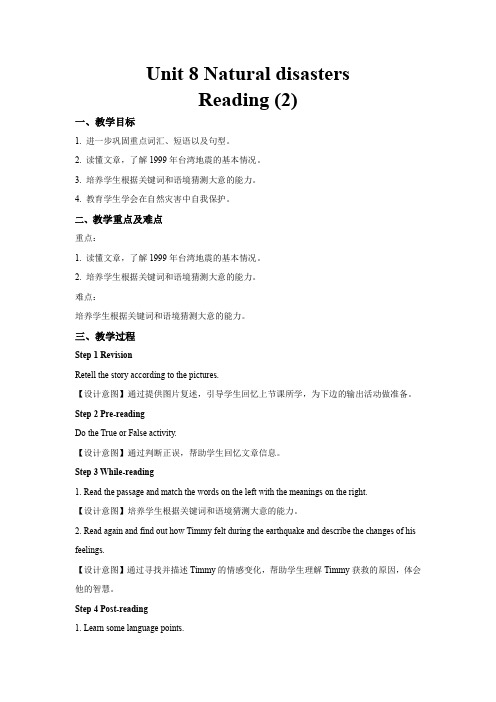
Unit 8 Natural disastersReading (2)一、教学目标1. 进一步巩固重点词汇、短语以及句型。
2. 读懂文章,了解1999年台湾地震的基本情况。
3. 培养学生根据关键词和语境猜测大意的能力。
4. 教育学生学会在自然灾害中自我保护。
二、教学重点及难点重点:1. 读懂文章,了解1999年台湾地震的基本情况。
2. 培养学生根据关键词和语境猜测大意的能力。
难点:培养学生根据关键词和语境猜测大意的能力。
三、教学过程Step 1 RevisionRetell the story according to the pictures.【设计意图】通过提供图片复述,引导学生回忆上节课所学,为下边的输出活动做准备。
Step 2 Pre-readingDo the True or False activity.【设计意图】通过判断正误,帮助学生回忆文章信息。
Step 3 While-reading1. Read the passage and match the words on the left with the meanings on the right.【设计意图】培养学生根据关键词和语境猜测大意的能力。
2. Read again and find out how Timmy felt during the earthquake and describe the changes of his feelings.【设计意图】通过寻找并描述Timmy的情感变化,帮助学生理解Timmy获救的原因,体会他的智慧。
Step 4 Post-reading1. Learn some language points.(1)People screamed in fear.(2)…, but I told myself to calm down since I was still alive.【设计意图】通过创设语境,讲解与操练重点语言点。
牛津译林版八年级上册Unit8《Naturaldisasters》(Studyskills)说课稿
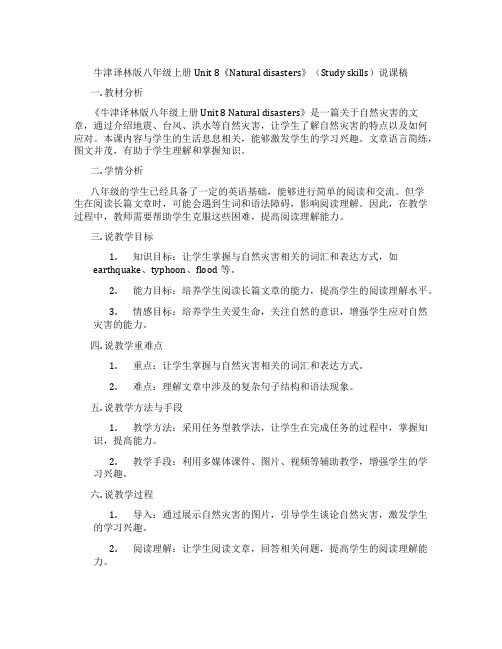
牛津译林版八年级上册Unit 8《Natural disasters》(Study skills)说课稿一. 教材分析《牛津译林版八年级上册Unit 8 Natural disasters》是一篇关于自然灾害的文章,通过介绍地震、台风、洪水等自然灾害,让学生了解自然灾害的特点以及如何应对。
本课内容与学生的生活息息相关,能够激发学生的学习兴趣。
文章语言简练,图文并茂,有助于学生理解和掌握知识。
二. 学情分析八年级的学生已经具备了一定的英语基础,能够进行简单的阅读和交流。
但学生在阅读长篇文章时,可能会遇到生词和语法障碍,影响阅读理解。
因此,在教学过程中,教师需要帮助学生克服这些困难,提高阅读理解能力。
三. 说教学目标1.知识目标:让学生掌握与自然灾害相关的词汇和表达方式,如earthquake、typhoon、flood等。
2.能力目标:培养学生阅读长篇文章的能力,提高学生的阅读理解水平。
3.情感目标:培养学生关爱生命,关注自然的意识,增强学生应对自然灾害的能力。
四. 说教学重难点1.重点:让学生掌握与自然灾害相关的词汇和表达方式。
2.难点:理解文章中涉及的复杂句子结构和语法现象。
五. 说教学方法与手段1.教学方法:采用任务型教学法,让学生在完成任务的过程中,掌握知识,提高能力。
2.教学手段:利用多媒体课件、图片、视频等辅助教学,增强学生的学习兴趣。
六. 说教学过程1.导入:通过展示自然灾害的图片,引导学生谈论自然灾害,激发学生的学习兴趣。
2.阅读理解:让学生阅读文章,回答相关问题,提高学生的阅读理解能力。
3.词汇学习:讲解文章中出现的生词和短语,让学生掌握与自然灾害相关的词汇。
4.语法讲解:分析文章中的复杂句子结构和语法现象,帮助学生理解。
5.小组讨论:让学生分小组讨论如何应对自然灾害,培养学生的合作意识。
6.总结:对本节课的内容进行总结,强化学生的记忆。
7.作业布置:让学生课后写一篇关于自然灾害的短文,提高学生的写作能力。
牛津译林版八年级上册Unit 8《Natural disasters》(Task)说课稿
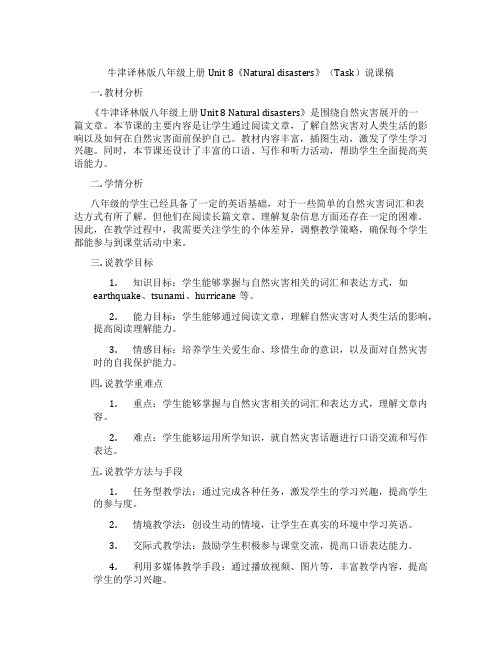
牛津译林版八年级上册Unit 8《Natural disasters》(Task)说课稿一. 教材分析《牛津译林版八年级上册Unit 8 Natural disasters》是围绕自然灾害展开的一篇文章。
本节课的主要内容是让学生通过阅读文章,了解自然灾害对人类生活的影响以及如何在自然灾害面前保护自己。
教材内容丰富,插图生动,激发了学生学习兴趣。
同时,本节课还设计了丰富的口语、写作和听力活动,帮助学生全面提高英语能力。
二. 学情分析八年级的学生已经具备了一定的英语基础,对于一些简单的自然灾害词汇和表达方式有所了解。
但他们在阅读长篇文章、理解复杂信息方面还存在一定的困难。
因此,在教学过程中,我需要关注学生的个体差异,调整教学策略,确保每个学生都能参与到课堂活动中来。
三. 说教学目标1.知识目标:学生能够掌握与自然灾害相关的词汇和表达方式,如earthquake、tsunami、hurricane等。
2.能力目标:学生能够通过阅读文章,理解自然灾害对人类生活的影响,提高阅读理解能力。
3.情感目标:培养学生关爱生命、珍惜生命的意识,以及面对自然灾害时的自我保护能力。
四. 说教学重难点1.重点:学生能够掌握与自然灾害相关的词汇和表达方式,理解文章内容。
2.难点:学生能够运用所学知识,就自然灾害话题进行口语交流和写作表达。
五. 说教学方法与手段1.任务型教学法:通过完成各种任务,激发学生的学习兴趣,提高学生的参与度。
2.情境教学法:创设生动的情境,让学生在真实的环境中学习英语。
3.交际式教学法:鼓励学生积极参与课堂交流,提高口语表达能力。
4.利用多媒体教学手段:通过播放视频、图片等,丰富教学内容,提高学生的学习兴趣。
六. 说教学过程1.导入:以一段关于自然灾害的视频导入,激发学生的学习兴趣。
2.阅读理解:学生阅读文章,回答相关问题,了解自然灾害对人类生活的影响。
3.词汇学习:学生通过小组合作,归纳总结文章中出现的自然灾害词汇。
新版牛津版八年级英语上册Unit8Naturaldisasters词汇与语法基础训练含答案
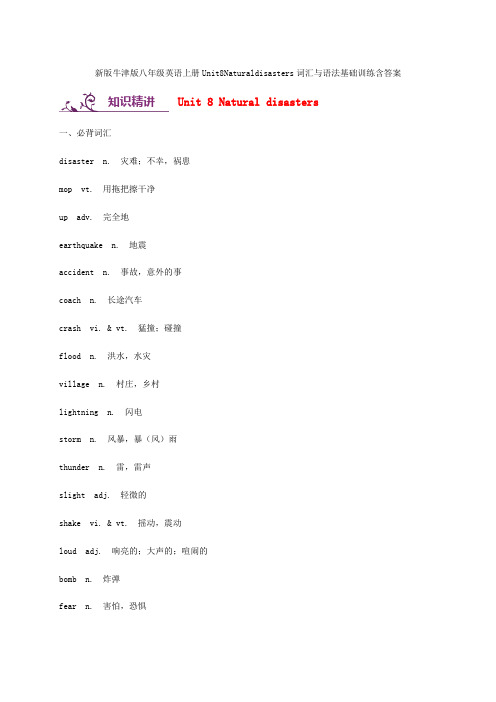
新版牛津版八年级英语上册Unit8Naturaldisasters 词汇与语法基础训练含答案一、必背词汇disaster n. 灾难;不幸,祸患 mop vt. 用拖把擦干净 up adv. 完全地 earthquake n. 地震 accident n. 事故,意外的事 coach n. 长途汽车crash vi. & vt. 猛撞;碰撞 flood n. 洪水,水灾 village n. 村庄,乡村 lightning n. 闪电 storm n. 风暴,暴(风)雨 thunder n. 雷,雷声 slight adj. 轻微的 shake vi. & vt. 摇动,震动 loud adj. 响亮的;大声的;喧闹的 bomb n. 炸弹 fear n. 害怕,恐惧Unit 8 Natural disasters知识精讲direction n. 方向brick n. 砖,砖块silent adj. 寂静的nervous adj. 紧张不安的heart n. 心脏beat vi. & vt. (使)规律作响,作节奏运动trapped adj. 困住的mind n. 头脑calm vi. & vt. (使)平静,(使)镇定since conj. 由于,既然still adv. 仍然alive adj. 活着的dark n. 黑暗shout n. 呼喊,喊叫声safe adj. 安全的asleep adj. 睡着的break vi. 损坏;打破towel n. 毛巾,浴巾rule n. 规则railway n. 铁路pancake n. 烙饼,薄饼burn n. 烧伤,烫伤,灼伤board n. 木板headache n. 头痛toothache n. 牙痛countryside n. 乡下, 农村nearly adv. 几乎,将近clear vt. 清除,清理shaking n. 摇动,震动二、重点词汇1. break verb /breɪk/1). to (cause something to) separate suddenly or violently into two or morepieces, or to (cause something to) stop working by being damaged 破碎,破裂;打破;打断;损坏,弄坏例句:The dish fell to the floor and broke.碟子掉到地上摔碎了。
译林版八年级英语上册Unit8Naturaldisaster(全章教案)
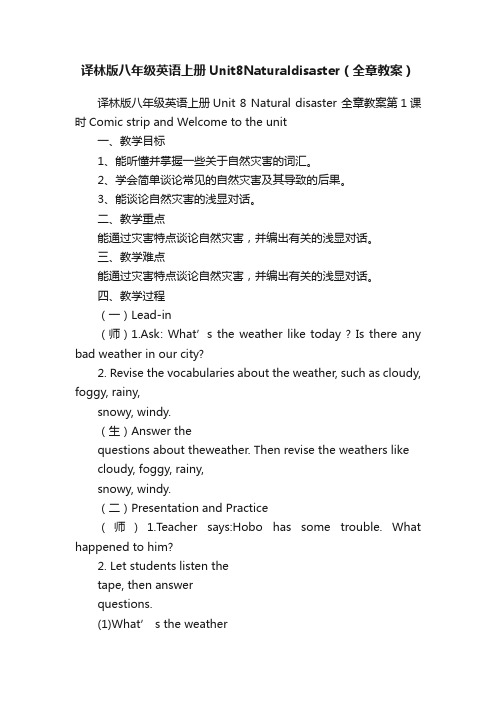
译林版八年级英语上册Unit8Naturaldisaster(全章教案)译林版八年级英语上册Unit 8 Natural disaster 全章教案第1课时Comic strip and Welcome to the unit一、教学目标1、能听懂并掌握一些关于自然灾害的词汇。
2、学会简单谈论常见的自然灾害及其导致的后果。
3、能谈论自然灾害的浅显对话。
二、教学重点能通过灾害特点谈论自然灾害,并编出有关的浅显对话。
三、教学难点能通过灾害特点谈论自然灾害,并编出有关的浅显对话。
四、教学过程(一)Lead-in(师)1.Ask: What’s the weather like today ? Is there any bad weather in our city?2. Revise the vocabularies about the weather, such as cloudy, foggy, rainy,snowy, windy.(生)Answer thequestions about theweather. Then revise the weathers like cloudy, foggy, rainy,snowy, windy.(二)Presentation and Practice(师)1.Teacher says:Hobo has some trouble. What happened to him?2. Let students listen thetape, then answerquestions.(1)What’ s the weatherlike ?(2)What was Hobo doing when it started to rain?(3)What did Hobo seeWhen he woke up?(4)Why doesn’t he wantto go home alone?3. Let students repeat the tape.4.Explanation.教师简单解释was sleeping的用法,引入过去进行时概念。
最新【牛津译林版】八年级英语上册:Unit 8 Natural disasters Reading

Fourth reading
While-reading
Timmy’s different feelings in different time
How did Timmy feel?
◆I tried my best to run out too, but I could not. (Line 5) ◆I felt nervous and my heart was beating fast. (Line 11) ◆“I’m trapped,” I said to myself. (Line 11) ◆A moment of fear went through my mind, but I told
making no or little sound
Pocket dictionary
Pre-reading
◆slight adj. 轻微的 ◆shake nv..摇摇动动
◆bomb n. 炸弹
◆fear n. 恐惧
◆direction n. 方向 ◆brick n. 砖块
Who saved Timmy? ◆silent adj. 寂静的 ◆nervous adj. 紧张的
•
16、业余生活要有意义,不要越轨。2021/5/102021/5/10May 10, 2021
•
17、一个人即使已登上顶峰,也仍要 自强不 息。2021/5/102021/5/102021/5/102021/5/10
Key expressions
shake scream direction come down silent be trapped calm down at last safe
myself to calm down since I was still alive. (Line 12) ◆I shouted for help, but no one came. (Line 14) ◆I screamed, “Help! Please help! I’m here!” (Line 18) ◆At last, I saw the bright daylight. I was safe. (Line 20)
Unit8 Natural Disasters 第3课时 ppt

Lead-in Watch a video and then answer a question
Lead-in Watch a video and then answer a question
◆What were people doing when the earthquake happened?
Presentation
Use the rule!
◇Circle the right verb.
Discovering
At this time yesterday, she is reading/was reading in the study.
What were you doing/did you do at nine o’clock last night?
Lead-in See some pictures of the Taiwan Earthquake
◆What did Timmy suddenly hear as he was trying to find his way out?
As I was trying to find my way out, I suddenly heard some noise above me.
Unit 8 Natural Disasters
第3课时 Grammar
牛津译林版 八年级上
Lead-in See some pictures of the Taiwan Earthquake
◆What was Timmy doing when the earthquake started? He was sleeping when the earthquake started.
Lead-in See some pictures of the Taiwan Earthquake
新牛津译林版八年级英语上册 Unit 8 Natural disasters. Reading 教案
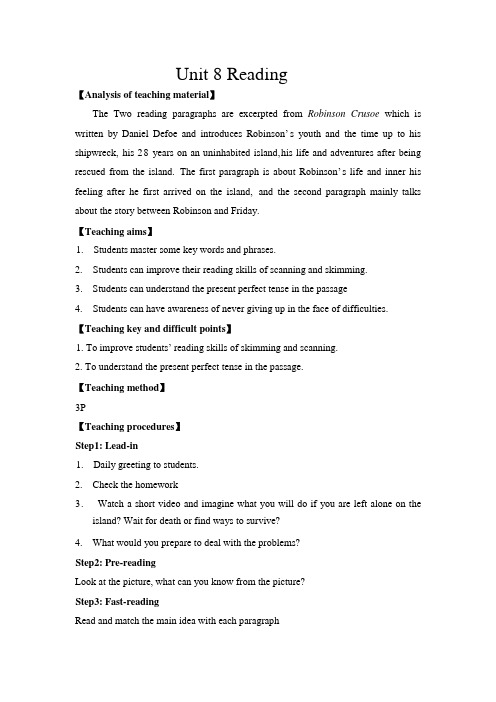
Unit 8 Readingof teachingThe Two reading paragraphs are excerpted from Robinson Crusoe which is written by Daniel Defoe and introduces Robinson’s youth and the time up to his shipwreck, his 28 years on an uninhabited island,his life and adventures after being rescued from the island.The first paragraph is about Robinson’s life and inner his feeling after he first arrived on the island,and the second paragraph mainly talks about the story between Robinson and Friday.1. Students master some key words and phrases.2. Students can improve their reading skills of scanning and skimming.3. Students can understand the present perfect tense in the passage4. Students can have awareness of never giving up in the face of difficulties.key and difficult1. To improve students’ reading skills of skimming and scanning.2. To understand the present perfect tense in the passage.3PStep1:Lead-in1. Daily greeting to students.2. Check the homework3. Watch a short video and imagine what you will do if you are left alone on theisland? Wait for death or find ways to survive?4. What would you prepare to deal with the problems?Step2:Pre-readingLook at the picture, what can you know from the picture?Step3:Fast-readingRead and match the main idea with each paragraphPara. 1 Robinson saved Friday and they helped each other.Para.2 Robinson ’s life on the islandStep3: Careful reading1. Imagine what problems you may have if you were left alone on the island just like Robinson?2. Read para. 1 and find what Robinson has done to deal with the problems?3. Read Para. 2 and complete the timelinea few weeks ago:Step 4: After reading1. What do you think of Robinson Crusoe?Robonsin is brave, creative, clever, optimistic and he is a ma full of wisdom and courage.2. What can we learn from Robinson Crusoe?Never give up trying in the face of difficulties.There are more ways than difficulties.Learn the importance of life skillsLife is fine, and learn to enjoy it.3. Is there anyone who has the same spirit as Robinson?4. Robinson and Friday lived on the island for 28 years. Finally, they were saved by a ship passing by. Can you make up your end to the story?Level 1:Tell the story of Robinson Crusoe to your friends after class.Level 2: Try to go on writing your own story of Robinson and share your story with us next class.designIn this reading class,individual learning and group cooperation are combined to promote to improve students’reading skills,and in some ways stimulate learning motivation of students. However, as the reading passages in grade 8 are becoming more and more difficult,some students still don’t have the habit of previewing, so they can’t finish the reading tasks within limited time. Besides, some students are not able to understand the present perfect tense in the st but not least,the text analysis is not enough.。
八年级英语上册 Unit 8 Natural disasters Reading课
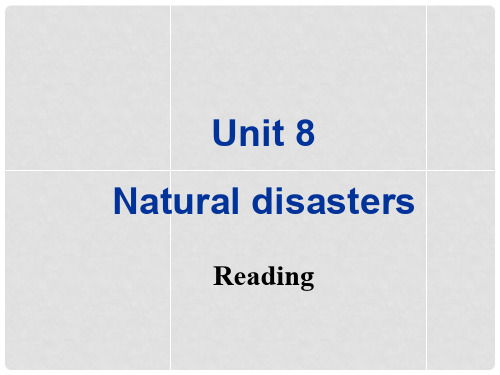
3. Why did some children scream?
4. What did people do after they heard the noise?
5. Did you know where you were when the noise and
I was trapped.
The wall came down.
Suppose you are Timmy and the partners are reporters, now they are interviewing you about the following questions.
1. Where were you when the earthquake started?
Movement: ran wildly
ran in all directions
walls began to come down
pieces of glass and bricks fell down
in fear screamed were very frightened
Fear: could not see at all a moment of fear
Key phrases
1. 感到一阵轻微的晃动 feel a slight shaking 2. 象打雷一样的一声巨响 a loud noise like thunder 3. 恐惧地相互对视 look at each other in fear
4. 四处奔跑 run in all directions
2. What happened in the shopping centre? 3. What happened to the buildings? 4. Where was Timmy when the shaking stopped? 5. How did Timmy feel? 6. What did Timmy do while he was waiting for help? 7. How was he saved?
译林版八年级英语上册Unit 8 Natural disaster 第3课时 Reading(2)教案
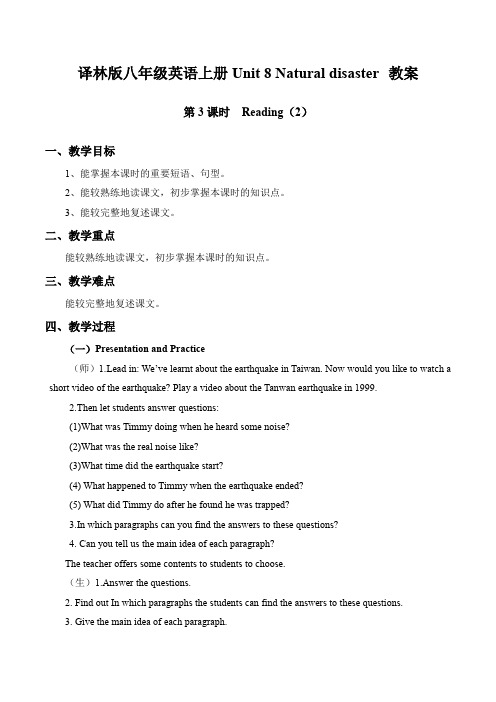
译林版八年级英语上册Unit 8Natural disaster教案第3课时Reading(2)一、教学目标1、能掌握本课时的重要短语、句型。
2、能较熟练地读课文,初步掌握本课时的知识点。
3、能较完整地复述课文。
二、教学重点能较熟练地读课文,初步掌握本课时的知识点。
三、教学难点能较完整地复述课文。
四、教学过程(一)Presentation and Practice(师)1.Lead in: We’ve learnt about the earthquake in Taiwan. Now would you like to watch a short video of the earthquake? Play a video about the Tanwan earthquake in 1999.2.Then let students answer questions:(1)What was Timmy doing when he heard some noise?(2)What was the real noise like?(3)What time did the earthquake start?(4) What happened to Timmy when the earthquake ended?(5) What did Timmy do after he found he was trapped?3.In which paragraphs can you find the answers to these questions?4. Can you tell us the main idea of each paragraph?The teacher offers some contents to students to choose.(生)1.Answer the questions.2. Find out In which paragraphs the students can find the answers to these questions.3. Give the main idea of each paragraph.(师)1.Teacher shows the language points to the students on the blackboard.2. Explain the language points to the students .3. Let students find more language points that they don’t understand.4. Exercises.Translate the following sentences:(1)开始下雨的时候,我正和朋友们在打篮球。
推荐八年级英语上册Unit8Naturaldisasters(第3课时)随堂练习(无答案)(新版)牛津版

Unit 8 Natural disasters(第3课时)★基础巩固Ⅰ.用所给单词的适当形式填空1. My father __________(have) his breakfast when I left for school this morning.2. Millie, l saw you and your father __________(sit)on the chairs at nine this morning.3. Oh, you are here! I __________(think) you were in the classroom4. The engineer __________(search)for some information on the Internet in the study while his wife was cooking in the kitchen5. Look! Some children __________(make) a snowman over there now. .6. __________you __________(mop) the floor at that time yesterday?7. What __________ he __________(do) from 5: 00 t0 7: 00 yesterdaymorning?8. I__________(read)the newspaper from 8: 00 to 10: 00 yesterdayevening.Ⅱ.用所给动词的正确形式完成短文。
There was always somebody standing beside me in the pastyears. When I l. ___________(sleep), I 2. _________(smell) thedelicious eggs you were making for my breakfast. When you3. _________(come) home after work, I 4. _________(do) homeworkin my bedroom While I 5. ________(watch)TV, you 6. ________(cook)the dinner. While I 7. ________ (talk) on the phone, you8. ________(clean)my room Thank you for doing everything forme in the past.Ⅲ.按要求改写句子。
八年级上册Unit8Naturaldisasters课时3ReadingⅡ牛津译林版

down .
一二三四五六
18. [2023·广州中考改编]她非常害怕,无法思考。 She was in great fear and couldn’t think .
19. 当听到警车的声响时,这些坏人们四处逃散。 When the bad men heard the sound of police cars, they ran in all directions .
C. at first
D. at once
一二三四五六
四、根据汉语意思完成句子。
16. 我们找不到出路,只好等待援助。
We couldn’t find our way out and had to
wait for help.
17. 经过漫长的时间,这里的老城墙开始坍塌了。
After a long time, the old city wall here began to come
of music. 5. [2024·芜湖月考]If the new traffic rules come out,the
roads will be much safer (安全的)then.
一二三四五六
点拨:safe作形容词意为“安全的”;而本题所填空的前 边有much,much通常修饰形容词的比较级,故此处应填 写safe的比较级safer。可修饰形容词比较级的词通常还 有:even,far, a little, rather等。
now feeling very
.
—Take it easy. You’ll make it.
A. peaceful
B. nervous
C. patient
D. sleepy
江苏省江阴市南闸实验学校八年级英语上册 Unit 8《Natural disasters》Readi
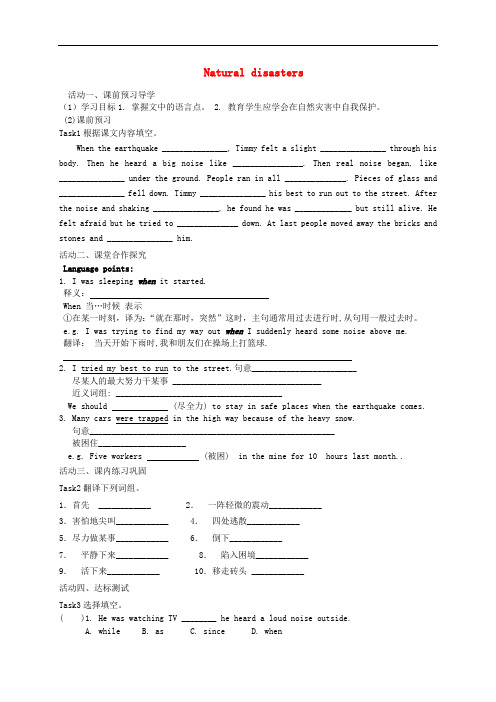
Natural disasters活动一、课前预习导学(1)学习目标1. 掌握文中的语言点。
2. 教育学生应学会在自然灾害中自我保护。
(2)课前预习Task1根据课文内容填空。
When the earthquake _______________, Timmy felt a slight _______________ through his body. Then he heard a big noise like ________________. Then real noise began, like _______________ under the ground. People ran in all ______________. Pieces of glass and _______________ fell down. Timmy _______________ his best to run out to the street. After the noise and shaking _______________, he found he was _____________ but still alive. He felt afraid but he tried to ______________ down. At last people moved away the bricks and stones and _______________ him.活动二、课堂合作探究Language points:1. I was sleeping when it started.释义:When 当…时候表示①在某一时刻,译为:“就在那时,突然”这时,主句通常用过去进行时,从句用一般过去时。
e.g. I was trying to find my way out when I suddenly heard some noise above me.翻译:当天开始下雨时,我和朋友们在操场上打篮球.2. I tried my best to run to the street.句意________________________尽某人的最大努力干某事 __________________________________近义词组: ______________________________________We should (尽全力) to stay in safe places when the earthquake comes. 3. Many cars were trapped in the high way because of the heavy snow.句意________________________________________________________被困住____________________e.g. Five workers (被困) in the mine for 10 hours last month..活动三、课内练习巩固Task2翻译下列词组。
- 1、下载文档前请自行甄别文档内容的完整性,平台不提供额外的编辑、内容补充、找答案等附加服务。
- 2、"仅部分预览"的文档,不可在线预览部分如存在完整性等问题,可反馈申请退款(可完整预览的文档不适用该条件!)。
- 3、如文档侵犯您的权益,请联系客服反馈,我们会尽快为您处理(人工客服工作时间:9:00-18:30)。
S:Yes.
T:Let's go on.
Step3:Show"Guide One"to the students.
Guide One_____
Read the text loudly by the students,then T explains some important language points.
T:I'm OK.Thank you.Sit down,please.
Step 2:Show"Learning aims"
T:Today we will learn Unit 8 Reading(II).Please look at our"Learning aim"(Then I read it slowly.)
课后反思
Unit 8 Natural disasters
课题及内容
Reading(II)
总课时数
7
教学
目标
1.读懂文章,了解1999年台湾地震的基本情况。
2.培养学生根据关键词和语境猜测大意的能力。
3.理解使用过去进行时的语境。
4.教育学生学会在自然灾害中自我保护。
教学
重、难
点
1.读懂文章,了解1999年台湾地震的基本情况。
2.培养学生根据关键词和语境猜测大意的能力。
3.理解在自然灾害中自我保护.
教学设计
Step 1:Daily greetings:
T:Good morning,everyone.
S:Good morning.
T:How are you?
S:I'm fine,thank you.And you?
Let's have a match and see who can do it best.
Step6:Class Exercise (一)
根据句意,用括号中所给单词的适当形式填空。
单项选择(课课练P81一、二)
Class Exercise (二)
根据汉语意思完成句子(课课练P81三)
板书设计
Reading(II)
Let's have a match and see who can do it best.
Step4:Show"Guide Two"to the students.
Guide Two___
Read the text again and do the exercise in Part B1 within ____minutes.
Let's have a match and see who can do it best.
Step5:Show"Guide Three"to the students.
Guide Three_____
Complete the exercise in Part B4 then read it in pairs within___minutes.
